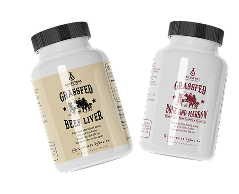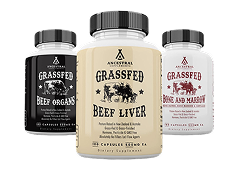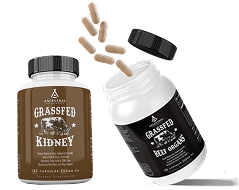7 Nutritional Beef Pancreas Benefits You Need to Know

Looking for a new addition to your ancestral (or nose-to-tail) diet that supports healthy blood sugar levels, digestive health, and nutrient density? Beef pancreas might not be the first organ meat that comes to mind, but it’s one that's packed with enzymes, protein, vitamins, and other bioactive compounds your body can put to good use.
Beef pancreas (or cow pancreas) offers unique benefits you won’t get from muscle meat alone, and it's valuable whether you’re following a carnivore diet or just want to explore more nutrient-dense animal-based foods.
Below, we'll explore what beef pancreas is, how it compares nutritionally to other organ meats, and the top reasons to consider consuming it.
What Is Beef Pancreas?
The pancreas is a glandular organ found in the abdomen of mammals, including cows. Its roles include supporting digestion and regulating blood sugar.
In cattle, just like in humans, the pancreas produces key digestive enzymes (like lipase, protease, and amylase), along with hormones like insulin and glucagon that help bring energy into cells.
Cow pancreas is considered a glandular organ, similar to the thymus or adrenal glands. It has long been incorporated into traditional diets and organotherapy practices due to its supportive effects on the pancreas and metabolic health. It's sometimes called "sweetbreads," which typically refers to a mix of organ meats from young animals like calves or lamb, including the thymus gland (from the throat) and pancreas.
While beef pancreas is not commonly found in most butcher’s cases, it’s available as a desiccated (dried) supplement and can be part of a whole-food-based approach to a well-rounded diet.
Beef Pancreas Nutrition
Like other organ meats, beef pancreas is rich in protein, vitamins, and minerals. It's higher in fat and calories per serving than other organ meats like beef liver, beef heart, and kidneys, for example. It’s also a natural source of enzymes, which makes it unique among other cuts.
Here's more about the nutritional content of beef pancreas:
Protein:
Beef pancreas is high in quality animal protein, which supplies all the essential amino acids your body needs for muscle recovery and maintenance, immune function, energy, and metabolic repair.
A 3-ounce serving (about 85 grams) contains roughly 13 grams of protein, a key macronutrient for controlling your appetite and repairing connective tissues throughout your body.
Carbohydrates:
There are virtually no carbs in beef pancreas, making it a keto diet and carnivore diet-friendly food. This zero-carb status makes it ideal for people looking to control their blood sugar, avoid glycemic spikes, and potentially help with getting into ketosis and losing weight.
Vitamins:
While beef pancreas is not as high in vitamin A or B12 as liver, it still provides important B vitamins and cofactors for metabolic health. These include:
-
Vitamin B5 (Pantothenic Acid, 67% of your DV): B5 helps to support adrenal function and energy metabolism.
-
Vitamin B2 (Riboflavin, 30% of your DV): B2 aids in energy production and antioxidant defense.
-
Vitamin B3 (Niacin, 24% of your DV): B3 is needed to convert food into usable energy and support DNA repair.
Minerals:
Beef pancreas may not get as much spotlight as liver or kidney, but it quietly delivers a valuable range of trace minerals that support energy, metabolism, and immune function.
A 3-ounce serving provides:
-
Phosphorus for bone health and cellular energy (ATP) production.
-
Selenium, a potent antioxidant and supporter of thyroid health.
-
Iron, which aids in oxygen transport and supports metabolic function.
-
Zinc, which supports immunity, enzyme activity, and tissue repair.
-
Small amounts of magnesium and potassium, which are electrolytes that are needed to regulate nerve function, muscle relaxation, blood sugar levels, and fluid balance.
While the quantities aren’t sky-high across the board, these minerals contribute to the overall nutritional density of beef pancreas, especially when paired with other organ meats in a nose-to-tail approach.
|
Nutrient |
Amount |
% Daily Value (DV) |
|
Calories |
199.86 kcal |
10% |
|
Protein |
13.35 g |
27% |
|
Total Fat |
15.81 g |
20% |
|
Saturated Fat |
5.46 g |
27% |
|
Monounsaturated Fat |
5.49 g |
— |
|
Polyunsaturated Fat |
2.94 g |
— |
|
Carbohydrates |
0 g |
0% |
|
Fiber |
0 g |
0% |
|
Cholesterol |
174.36 mg |
58% |
|
Vitamin |
Amount |
% DV |
|
Vitamin A |
0 IU |
0% |
|
Vitamin C |
11.64 mg |
13% |
|
Thiamin (B1) |
0.12 mg |
10% |
|
Riboflavin (B2) |
0.39 mg |
30% |
|
Niacin (B3) |
3.78 mg |
24% |
|
Pantothenic Acid (B5) |
3.33 mg |
67% |
|
Vitamin B6 |
0.18 mg |
11% |
|
Folate |
2.55 mcg |
1% |
|
Vitamin B12 |
11.91 mcg |
497% |
|
Calcium |
7.65 mg |
<1% |
|
Iron |
1.89 mg |
10% |
|
Magnesium |
15.3 mg |
4% |
|
Phosphorus |
278.1 mg |
22% |
|
Potassium |
234.75 mg |
5% |
|
Sodium |
56.97 mg |
2% |
|
Zinc |
2.19 mg |
20% |
|
Copper |
0.06 mg |
7% |
|
Manganese |
0.12 mg |
5% |
|
Selenium |
21 mcg |
38% |
7 Best Beef Pancreas Benefits for Your Diet
1. Supports Digestive Health
Your own pancreas and the pancreas of animals contain naturally occurring digestive enzymes like amylase, lipase, and protease, which help your body break down carbohydrates, fats, and proteins. Either eating or supplementing with beef pancreas can help support digestive function.
2. Very High in Bioavailable Vitamin B12 and B Vitamins
With nearly 500% of your daily vitamin B12 needs in just three ounces, beef pancreas is one of the most concentrated food sources of B12.
B12 is a nutrient that's essential for red blood cell formation, brain health, and energy production.
Many people, especially vegans, vegetarians, and older adults, are at risk for B12 deficiency, which can cause fatigue, mood issues, and brain fog. When deficiency occurs, or to help prevent it, eating foods high in B12 (or supplementing) is recommended.
Beef pancreas also supplies B2 (riboflavin), B3 (niacin), B5 (pantothenic acid), and B6, all of which support mitochondrial function and metabolic health.
3. Provides Healthy Fats for Hormone and Brain Support
Unlike some lean organ meats, beef pancreas contains about 16 grams of fat per three ounces, meaning it's a high-fat food—although this isn't necessarily a bad thing. It contains a combination of saturated, monounsaturated, and polyunsaturated fats, which can help support:
-
Hormone synthesis (such as the production of testosterone and estrogen)
-
Nervous system support
-
Brain function and mental health
-
Satiety and appetite control
-
Nutrient absorption of essential fat-soluble vitamins
-
Longer-lasting energy
The fat content in beef pancreas is especially helpful for low-carb or ketogenic eaters (or those on the ketovore diet) who require more fat to meet their macro targets, sustain their energy, and/or to remain in ketosis.
For instance, keto dieters should aim to get about 70% or more of their daily calories from fat, which can include fatty cuts of meat and organ meats like beef pancreas.
4. Contains Zero Carbohydrates & Is High Protein for Muscle Support
With 13 grams of protein and zero grams of carbs per three ounce serving, beef pancreas fits well into ketogenic, low-carb, carnivore, and Paleo diets. The amino acid profile supports:
-
Muscle maintenance and recovery
-
Satiety and appetite regulation
-
Metabolic function
-
Immune defenses
-
Healthy energy levels and mental performance
-
And more
5. Supports Blood Sugar and Metabolic Health
The pancreas is involved in blood sugar regulation because it produces insulin. While beef pancreas doesn’t contain insulin itself, consuming pancreas tissue may support metabolic health through the concept of organotherapy, in which it's believed that nutrients from an animal organ help support the same organ in the human body.
This like-supports-like principle is rooted in Traditional Chinese Medicine and other ancestral systems. Beef pancreas has long been used in these traditions, as well as in modern functional medicine.
Some research and clinical experience suggest that peptides, enzymes, and cofactors in glandular tissues may help nourish and regulate corresponding organs, potentially promoting pancreatic function and healthy glucose metabolism.
6. A Source of Zinc and Selenium for Immunity and Thyroid Health
Zinc and selenium are two trace minerals found in beef pancreas that help promote immune resilience, thyroid hormone activation, and antioxidant defense. One serving provides 20% of your daily zinc needs and 38% of selenium.
Many modern diets are low in selenium due to factors such as soil depletion, and zinc deficiency is common among those who don't eat zinc-rich foods, athletes, vegans, and people under chronic stress.
7. Good Source of Phosphorus, Iron, and Vitamin C
Beef pancreas delivers an impressive trio of essential nutrients that support whole-body health, including bones, immune defenses, and a healthy blood supply:
-
Phosphorus (about 22% DV per serving): This mineral is critical for bone health, energy production, and cellular repair. About 80% of your body's phosphorus is stored in your teeth and bones.
-
Iron (about 11% DV): Provides heme iron, the most bioavailable form (even more so than plant sources), which many organ meats provide in high amounts. Iron is important for oxygen transport and preventing fatigue.
-
Vitamin C (13% DV): While vitamin C is rare in red meats, this antioxidant helps protect cells from damage, supports collagen production, and can support a healthy immune system.
Together, these nutrients make beef pancreas a valuable addition to a nutrient-dense, whole foods-based diet, especially for those looking to support energy, immunity, and tissue repair.
What’s the Best Way to Consume Beef Pancreas?
Eating fresh beef pancreas is an option, but it's not easy to find, prepare, or stomach for most people. The texture and strong organ flavor can be off-putting, even for those who are used to eating liver or kidney.
Cooking it also risks damaging some of the delicate enzymes and peptides found in beef pancreas, which is why raw pancreas may be preferable (much like some people choose to eat raw liver).
Capsules allow you to get the benefits of glandular nutrition daily, without needing to change your diet or culinary routine.
That’s why desiccated beef pancreas supplements are the preferred method for many people. These freeze-dried capsules retain the nutritional integrity of the organ and are simple to take, even without needing to do any prep or cooking.
For the highest quality and best results, look for desiccated organ meat products made from:
-
Grass-fed, pasture-raised cattle
-
Free of fillers, added hormones, and antibiotics
-
Freeze-dried to preserve heat-sensitive nutrients
How to Add Grass-Fed Beef Pancreas Supplements to Your Diet
If you're ready to experience the health benefits of this nutrient-dense superfood, Ancestral Supplements makes it easy to start.
For those focused on blood sugar balance, digestive enzyme support, or simply seeking to eat more nose-to-tail, adding grass-fed beef pancreas to your supplement stack can offer targeted nourishment from one of the body’s most overlooked yet vital organs.
Shop our Grass Fed Beef Pancreas supplement to give your body the glandular support it craves.



















